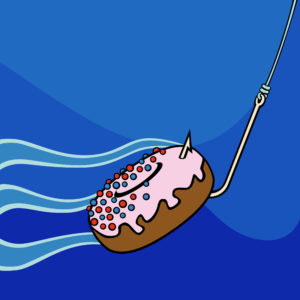MindCheck is the Weekly Wednesday Kids Mental Health series with Dr. Ray Pataracchia N.D. MindCheck provides in depth information on the orthomolecular approach to coping with mood, behavior and psychotic disorders. The MindCheck Health Series is endorsed by the Mindful Network – ‘A Better Future for Children’s Mental Health’.

… Sweet cravings are a huge component of our Canadian lifestyle … Canadians consume the most donuts per capita … a glazed donut has about 13tsp sugar …
Sugar Addiction in Mental Health
The addiction of sugar is common contributing factor in ADD, ADHD, depression, anxiety, OCD, and schizophrenia.
Addiction = the state of being enslaved by a habit, a practice, or some psychological or physical habit-forming temptation.
Such temptations come in various forms – sugar, junk food, caffeine, narcotics, gluten, dairy, etcetera. The severity of addiction can be assessed by the degree of adherence to the temptation and, the degree to which the cessation of the behavior causes trauma.
Sugar Addiction Behavior Patterns
Some addictive traits associated with sugar (& processed food and flour) include:
craving and consuming certain foods when not hungry
worrying about limiting intake of certain foods
sluggishness and fatigue after overeating
maintaining a poor eating habit despite negative impact on health, socializing, academic/work performance,
escalation of the need for foods craved to get same pleasure or emotional stability
The Brains Intimate Relationship with Sugar
The brain as a command center of voluntary and involuntary body functions and it maintains a fast metabolic rate by demanding 80% of our blood supply and grabbing the sugar out of it with the aid of special glucose sensing neurons. This is why we see so many behavior and mental health conditions associated with sugar related conditions.
Orthomolecular Medicine is key here in addressing the relation of sugar and behavior. Conditions such as schizophrenia, ADD, ADHD, mood disorders, and general mental health are all influenced by sugar imbalance.
Sugar Addiction
More and more people are reliant on sugar. Our fast paced lifestyle and reliance on refined/processed food creates unhealthy outcomes. The vast majority of us consume a 60% carbohydrate diet. Fast sugars (e.g. junk food) are carbohydrates that metabolize quickly or convert to fat. The brain suffers as it needs more sugar to keep up with the demand. Ideal carbohydrate consumption should be about 40% of your intake.
Diabetes is on the rise for both Kids & Adults
Diabetics have elevated blood sugar (glucose) and the ultimate effect is that sugar does not get into cells.
Diabetes is the most common chronic disease in kids. 90-95% of those with diabetes have type II diabetes. The proportion of those with diabetes rises sharply after age 40. In 2005, statistics showed that almost 7% of the population over age 19 had diabetes. In 2010 it was estimated that 2.5 million Canadians had diabetes. Before we reach 2020, researchers estimate that another 1.2 million will be diagnosed. Gestational diabetes is found in 3-5% of pregnant women who have a live birth.
Other Sugar Deprivation States
If sugar does not reach cells, this creates a state of cellular energy deficiency. This can occur if you have insulin resistance or hypoglycemia. Many psychotropic medications are associated with higher risk of insulin resistance.
Insulin Resistance
Insulin inhibits the breakdown of fat and promotes fat deposition.
Type II diabetes is predominantly an adult onset condition with a majority of cases having excess blood insulin. The loss of insulin receptors on cells is a major factor in type II diabetes. This creates a state of insulin resistance. By contrast, type I diabetes is a condition with a lack of insulin production. In type II diabetes, treatment with insulin can be counterproductive as the addition of insulin to an already high insulin environment can contribute to greater fat deposition and weight gain. With high insulin, fat can disrupt blood vessels and contribute to vessel resistance and cardiovascular problems.
Dietary Influences
Diets high in refined sugar are low in chromium and high blood insulin is associated with chromium deficiency. Chromium is a component of glucose tolerance factor (GTF). GTF is involved in activating the action of insulin to regulate blood sugar. Vitamin B3 (niacin) is also a component of GTF.
High quality protein from high quality protein meals releases sugar gradually thus supplying the brain with a steady supply of sugar for steady on-demand neurotransmitter manufacturing. Low protein diets are inherently carbohydrate dominant and result in an unsustained fast release of sugar that does not support on-demand neurotransmitter manufacturing. Low blood sugar (hypoglycemia) may be due to low protein dieting or an insulin resistant state. Regular high quality protein intake is key here as well as nutrient support to aid sugar metabolism.
Hyperactivity as in ADHD can be aggravated by vacillating sugar drops. Criminal behavior may also have a tie in with sugar drops. The work of orthomolecular pioneer Carl Pfeiffer showed that metal deposition was potentially a contributing factor to criminal behavior. Hypoglycemic symptoms include feeling better while arguing/venting and being tired after meals.
Agriculture and the Mono-Cropping Craze
Carbohydrate dominance in our food supply is made worse with the bombardment of gluten-containing fillers in products. Gluten is naturally found in wheat, rye, and barley. Gluten is a large protein used in food as a filler and structural binder, and with agricultural genetic engineering, the natural structure of this protein as we know it has been altered. Humans respond to the constant bombardment of large proteins by succumbing and ‘looking’ at these proteins as foreign entities and eliciting immune retaliation (‘a war’). Hence we see a plethora of examples in society of allergic reactions that can be stemmed to gluten; gluten hits the mental and physical sphere and is thus involved in conditions such as ADD, ADHD, depression, anxiety, OCD, schizophrenia, arthritis, skin conditions, asthma, etcetera. Targeted orthomolecular dietary approaches often includes the elimination of gluten.
Saccharine Disease
Orthomolecular pioneer Abram Hoffer often commented that the agricultural trend of infiltrating the food supply with wheat grain was a means to an end from an allergic and carbohydrate dominant perspective. He also commented on the issue of saccharine disease. Saccharine disease was a term used to describe carbohydrate dominance due to excessive refined sugar intake. Refined sugars are found in processed foods/drinks, and sweeteners. These refined sugars create fast spikes in sugar that are not sustained and promote insulin imbalance, fat deposition, mood vacillations, and hyper/kinetic behavior.
High Insulin and Thyroid Hormone Suppression
When insulin is high thyroid hormone is suppressed. This enforces the need to assess and treat thyroid metabolism as a part of targeted orthomolecular therapy.

